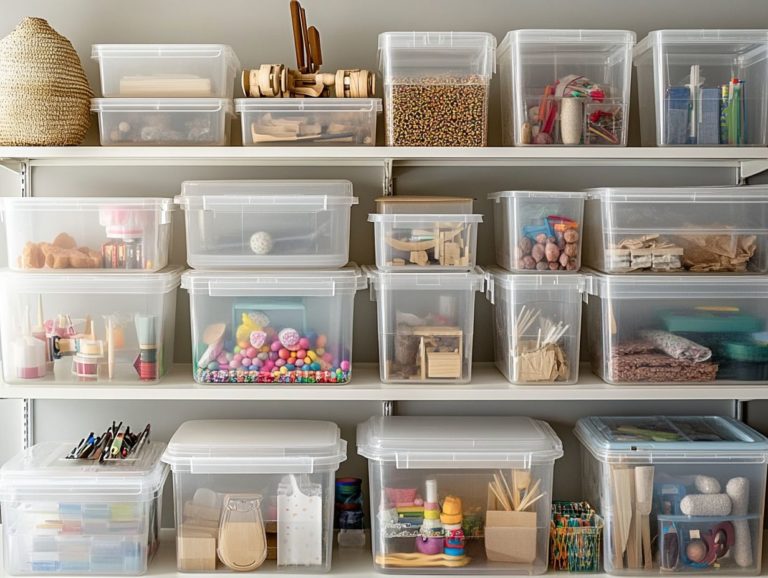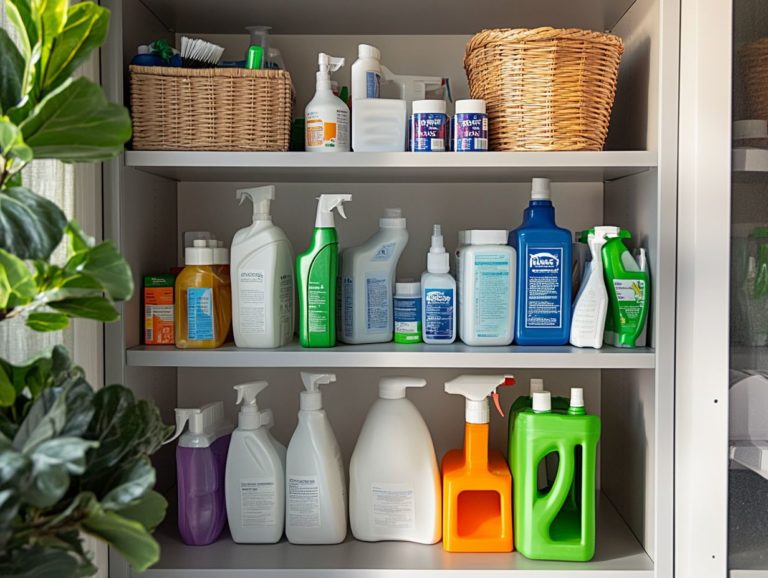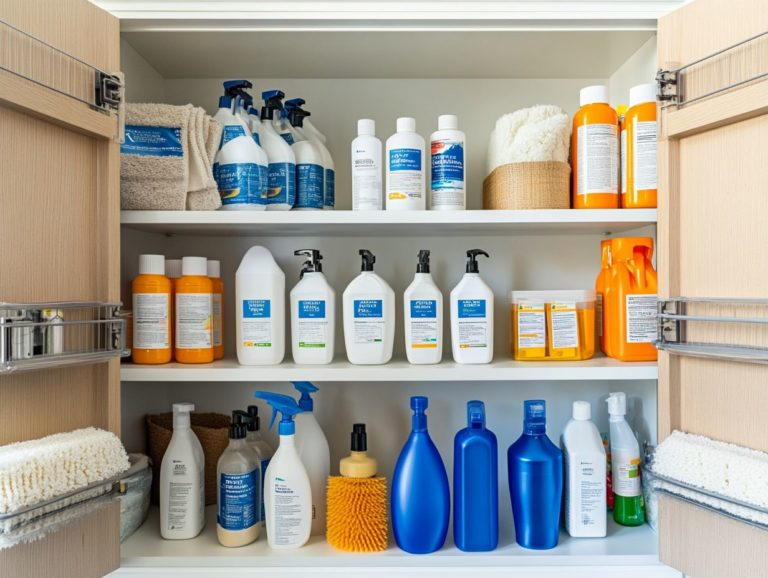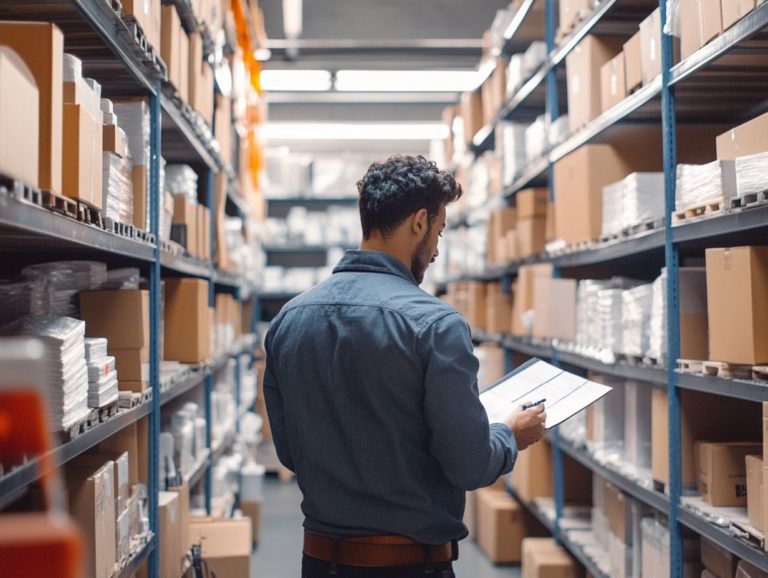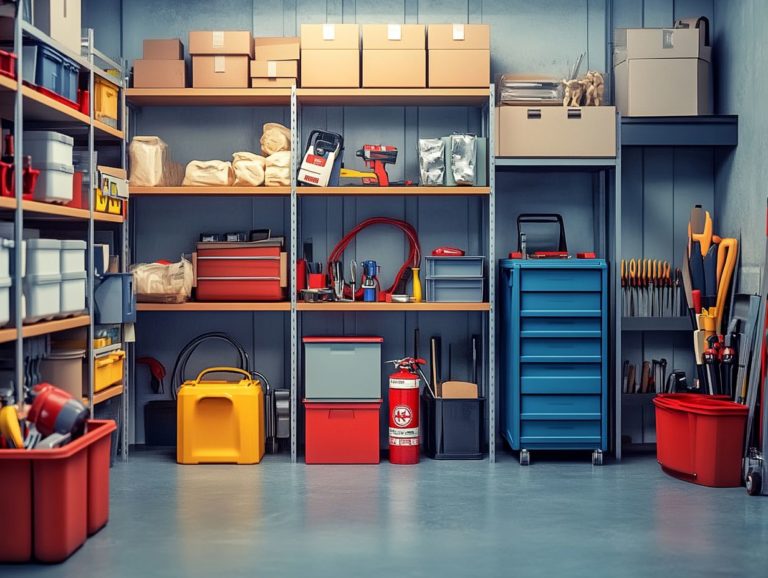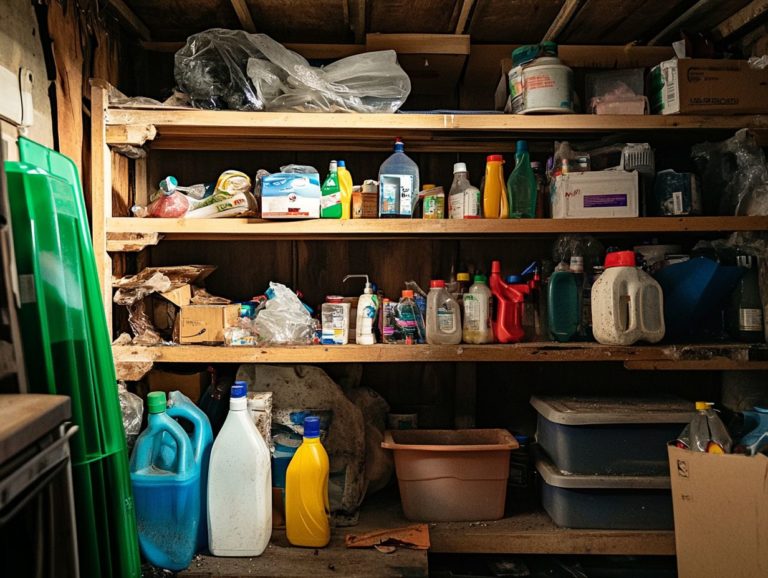How to Store the Most Common Household Cleaners
Proper storage of household cleaning supplies is essential for ensuring both safety and effectiveness.
By adopting the right practices, you can prevent accidents involving children and pets, preserve the integrity of your household cleaning products, and cultivate a more organized home environment.
This guide will provide you with essential storage rules, tailored advice for various types of cleaners, tips on handling accidental exposures, and safe disposal methods.
By following these guidelines, you can safeguard your home and family while relishing in a clean and tidy space.
Contents
- Key Takeaways:
- Why is Proper Storage Important?
- General Rules for Storing Household Cleaners
- How to Store Specific Types of Cleaners
- What to Do in Case of Accidental Ingestion or Exposure
- How to Dispose of Household Cleaners Safely
- Frequently Asked Questions
- What are the most common household cleaners and household cleaning supplies that need to be stored properly?
- Why is it important to properly store household cleaners and cleaning products?
- Where should I store household cleaners and household cleaning supplies?
- How can I prevent accidental spills and leaks from household cleaners and cleaning products?
- Can different types of household cleaners and cleaning products be stored together?
- What should I do if a household cleaner or cleaning product spills or leaks?
Key Takeaways:
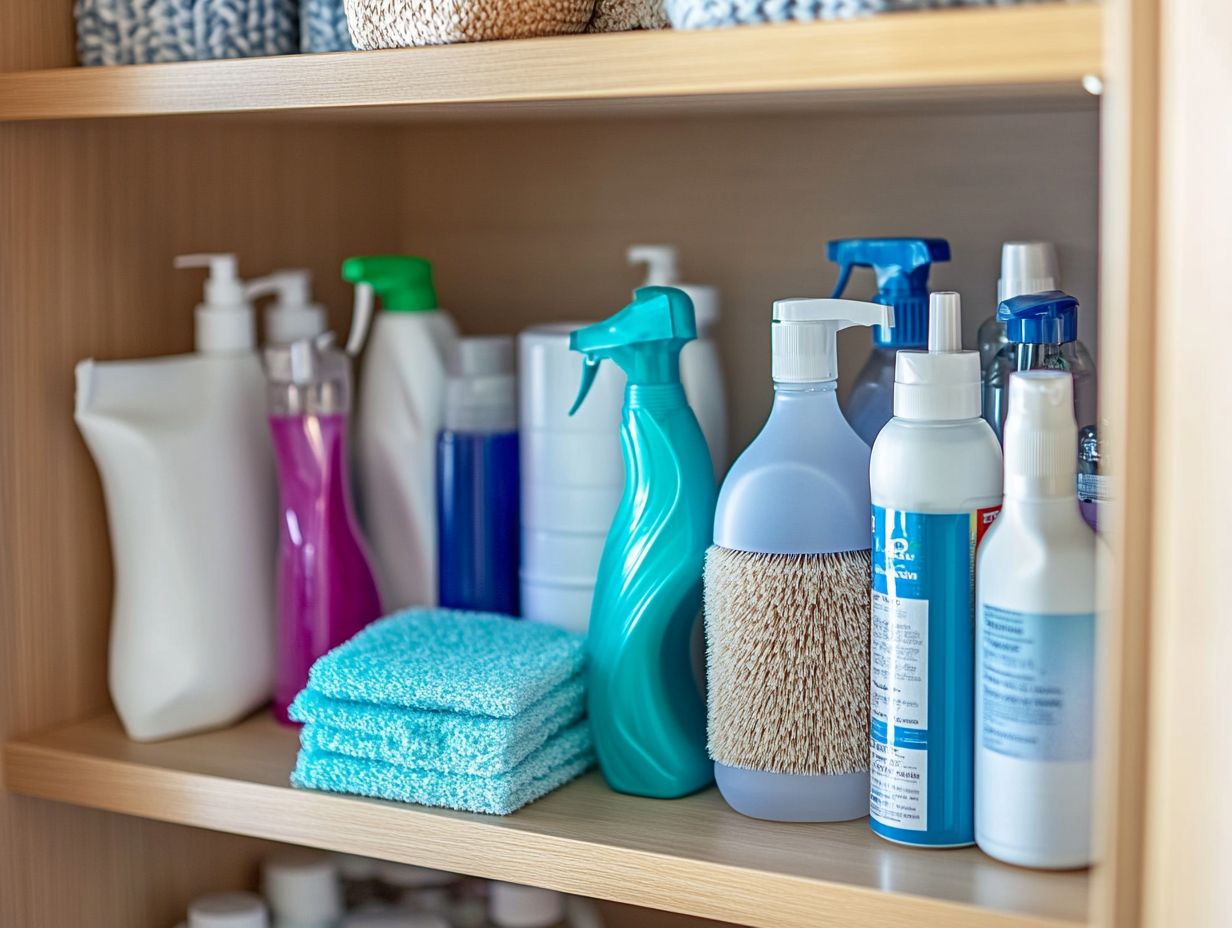
- Proper storage of household cleaning supplies is important to ensure safety for children, pets, and the environment.
- Follow general rules such as keeping cleaners out of reach, in original containers, never removing labels, storing in a cool, dry place, and keeping away from direct sunlight.
- Different types of cleaners may have specific storage requirements, such as keeping bleach and ammonia away from each other and storing kitchen cleaners and wood cleaners in airtight containers to prevent evaporation.
Why is Proper Storage Important?
Properly storing your cleaning supplies is essential for the safety of children and pets while enhancing the effectiveness of your household cleaning routines.
Poor storage can lead to kids or pets accidentally getting into harmful cleaning products. It is crucial for you to adhere to guidelines from reputable sources like the American Cleaning Institute.
Thoughtful storage helps prevent accidents and creates an organized cleaning process. It ensures that your products are easily accessible and securely stored in their original containers. Paying attention to detail helps reduce risks associated with household cleaning products and improves your overall cleaning efficiency.
General Rules for Storing Household Cleaners
Storing household cleaners safely minimizes the risks associated with household chemicals and ensures that your cleaning products work effectively. By implementing some straightforward rules for storing your cleaning supplies, you not only organize your tools but also maintain efficiency during your cleaning routine.
Remember to keep products in their original containers, follow the directions for use and storage, and conduct routine safety checks to confirm that everything is stored properly.
By adhering to these guidelines, create a safer space for your kids and pets today while streamlining your household cleaning strategies. Regular cleaning safety tips can further enhance your efforts.
1. Keep Out of Reach of Children and Pets
Keeping cleaning supplies out of reach from children and pets is a fundamental safety measure you should adopt in your household. This simple act is crucial for preventing accidental exposure to harmful chemicals often found in cleaning products.
Consider implementing child-proof locks on cabinets and utilizing high storage spaces as effective strategies to secure these items.
A thoughtful approach involves placing cleaning products on high shelves, making them entirely inaccessible to curious little hands and paws. Using locked storage bins provides an extra layer of protection, allowing for convenient access while keeping potentially dangerous materials tucked away from sight.
Beyond physical barriers, fostering an open dialogue within your home about the risks associated with these products is essential. Teach your children to recognize cleaning supplies and understand their dangers, and demonstrate safe cleaning practices. This gives them the power to play a role in creating a safer environment. Remember, knowledge is just as crucial as barriers when it comes to preventing accidents.
2. Store in Original Containers
Always store your household cleaners in their original containers. This practice boosts safety and ensures your products work effectively.
Original containers have labels that provide essential information, including usage instructions and safety precautions. By keeping your cleaning supplies in their designated packaging, you can easily reference this critical information, reducing the likelihood of misuse or accidental mixing of incompatible products.
These containers are designed to handle the specific properties of their contents, ensuring that the integrity of the product is preserved over time.
Transferring products to unmarked or inappropriate containers can lead to confusion and potential harm. For example, using a spray bottle that previously held a different substance can create uncertainty about the safety of its new contents, increasing the risk of chemical reactions or skin irritation.
Improperly storing hazardous materials in non-compliant containers can also result in leaks or degradation, as these containers may not withstand the contents’ properties. Always store your products in their original containers, ensuring that all labels remain intact and visible.
This simple practice not only preserves safety but also helps your cleaning supplies remain effective.
3. Keep in a Cool, Dry Place
Storing your cleaning supplies in a cool, dry place is crucial for maintaining their effectiveness. High temperatures and humidity can trigger reactions that compromise your cleaning solutions.
By organizing your cleaning products in a designated area that meets these conditions, you prolong their shelf life and ensure they are ready for use. Adequate ventilation can further enhance both safety and product longevity.
Consider common areas, like under the kitchen or bathroom sink, for storage. Just ensure these spots are shielded from direct sunlight and heat sources.
Aim for a cool, dry space with controlled humidity to prevent any degradation of the products. Using shelves or clear bins creates an organized system that separates different types of cleaners.
Labeling containers allows for quick access and promotes safety by helping you identify potential hazards and take necessary precautions during use.
4. Avoid Direct Sunlight
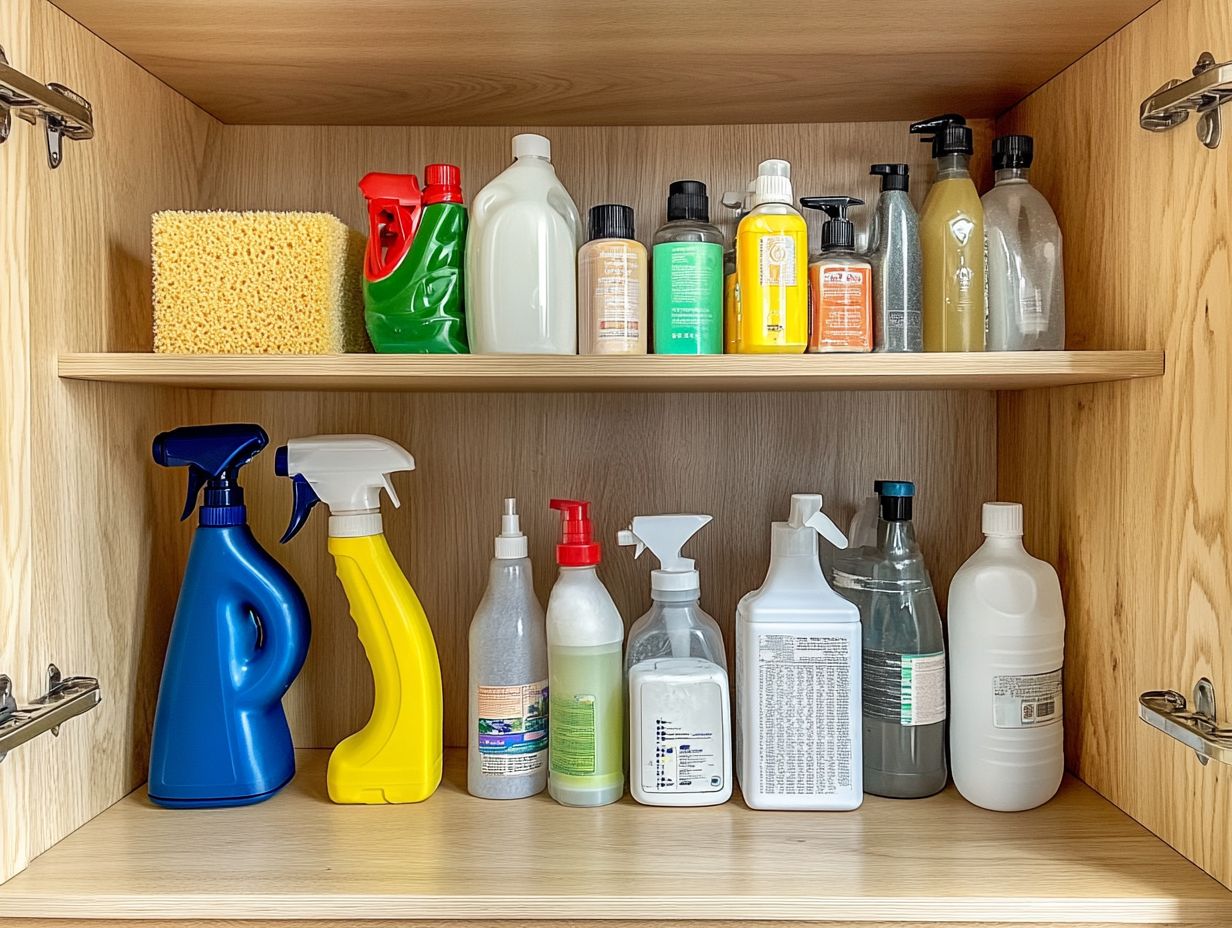
Keep your cleaning supplies out of direct sunlight. This helps preserve their effectiveness and keeps your home safer.
Sunlight can cause certain cleaning solutions to break down, which diminishes their effectiveness and can lead to harmful byproducts. Store cleaning products in a shaded area or in opaque containers to minimize light exposure.
Some products, like hydrogen peroxide and specific bleach formulations, are particularly sensitive to light. Ultraviolet rays can accelerate their decomposition, reducing their effectiveness.
For example, when hydrogen peroxide is exposed to sunlight, it breaks down into water and oxygen, losing its powerful disinfecting properties.
To store these products effectively, choose dark-colored or amber bottles that limit light penetration and keep your cleaners in a cool, dry place, such as a pantry or cabinet away from windows.
By implementing these measures, you enhance the performance of your cleaning agents and ensure a healthier home environment.
How to Store Specific Types of Cleaners
Understanding how to store specific types of cleaners is essential for maximizing their effectiveness and maintaining safety in your home. Each cleaning solution, from bleach to ammonia and all-purpose cleaners, possesses a unique chemical composition that demands a tailored storage approach.
By organizing these products according to their specific storage requirements and following necessary safety precautions, you can effectively mitigate potential hazards linked to improper storage. This knowledge not only streamlines your cleaning process but also elevates the organization of your cleaning supplies, transforming your cleaning routine into a more efficient and safe endeavor.
1. Bleach
Bleach is a powerful disinfectant and stain remover, so proper storage is crucial for ensuring both safety and effectiveness. Always keep it tightly sealed in its original container and store it in a cool, dry place away from direct sunlight. Mixing bleach with other household chemicals is definitely forbidden; doing so can create dangerous reactions that may produce toxic fumes. Follow these guidelines to keep your space safe and make the most of bleach in your cleaning routine! Act now to keep your cleaning supplies safe and effective!
Due to its strong chemical nature, mishandling bleach can lead to significant risks, including respiratory issues and skin irritation. To use bleach safely, it s wise to:
- Don gloves and protective eyewear, especially when working with concentrated solutions or household chemicals.
- Ensure that the area is well-ventilated to minimize inhalation of fumes, as part of routine safety checks.
When adding bleach to your cleaning mixtures, remain vigilant: it s best to use it as a standalone cleaning agent rather than combining it with products like ammonia or vinegar. Remember, household cleaning safety is crucial. By following these essential chemical safety practices, you not only protect your health but also enhance the overall effectiveness of your cleaning efforts. Check the guidelines from the American Cleaning Institute for more cleaning safety tips.
2. Ammonia
Ammonia is a powerhouse when it comes to household cleaning, expertly cutting through grease and grime. However, it demands your careful attention during handling and storage. Always store products in a well-ventilated area, away from heat sources and direct sunlight, preferably in their original containers to maintain safety.
When you use ammonia, remember: don t mix products like bleach or any chlorine-containing products, as this can create toxic chloramine vapors (harmful gases that can irritate the lungs). By adhering to proper storage and usage guidelines, you can significantly enhance your cleaning effectiveness while keeping your home safe. Safety is essential for children, pets, and your overall cleaning process.
To maintain the integrity of ammonia and avoid any hazardous situations, make sure the storage area is well-ventilated and free from dangerous chemicals. Cleaning systems and strategic cleaning techniques can also play a role in safe handling. Organized cleaning strategies, like using clear bins, can help you manage your supplies effectively. When it s time to clean, donning gloves and eye protection is wise to prevent any irritation. Always dilute ammonia with water before application; this promotes a more controlled and safer cleaning experience.
Once you ve finished cleaning, don t forget to rinse the area thoroughly and ventilate the space to clear out any lingering fumes, ensuring a safer environment in your home.
In summary, keeping your cleaning supplies organized and stored properly not only enhances effectiveness but also ensures safety for everyone in your household. Take action today to create a safer and more efficient cleaning environment!
3. Dishwashing Detergent
Every kitchen needs dishwashing detergent for sparkling clean dishes. This essential item is renowned for its impressive ability to cut through grease and eliminate food residues with ease. Household cleaning supplies like these are crucial for daily cleaning. Store it in a cool, dry place, well out of reach of children and pets to ensure safety and optimal cleaning power.
Keep the detergent in its original container with the label intact. This practice helps you track expiration dates and follow product directions accurately. Follow these guidelines to ensure a clean and safe kitchen!
An organized storage strategy works wonders. Designate a specific cabinet or shelf for all your cleaning supplies, making it easy to locate your dishwashing detergent. This will also minimize the risk of accidents. Always keep those detergent bottles tightly sealed to prevent any leakage or contamination, ensuring safe storage.
Regularly check your stock levels and perform routine safety checks to prevent running low at inconvenient times.
Group similar products together for easier access and a more streamlined and efficient kitchen cleaning process. By being mindful of these practices, you can extend the shelf life of your dishwashing detergent while enhancing your overall dishwashing efficiency.
4. Glass Cleaners
Glass cleaners are vital cleaning solutions that provide your surfaces with a streak-free shine.
These products are essential for achieving that coveted streak-free shine on your windows and mirrors. Proper storage is key to ensuring their effectiveness and safety. Always keep glass cleaners in their original containers, away from heat sources and direct sunlight. Due to potentially harmful chemicals, keep them out of reach of children and pets.
When you re ready to clean, spray the glass cleaner directly onto the surface instead of onto your cloth. This method promotes even distribution and minimizes the risk of streaking. Use a microfiber cloth for optimal results, as it captures dust and grime without scratching the glass. Work in small sections and use overlapping strokes for a thorough clean.
After you ve finished, store the remaining product in a cool, dry place. This simple step prevents the breakdown of the cleaner and prolongs its life and efficiency for your next cleaning session.
5. All-Purpose Cleaners
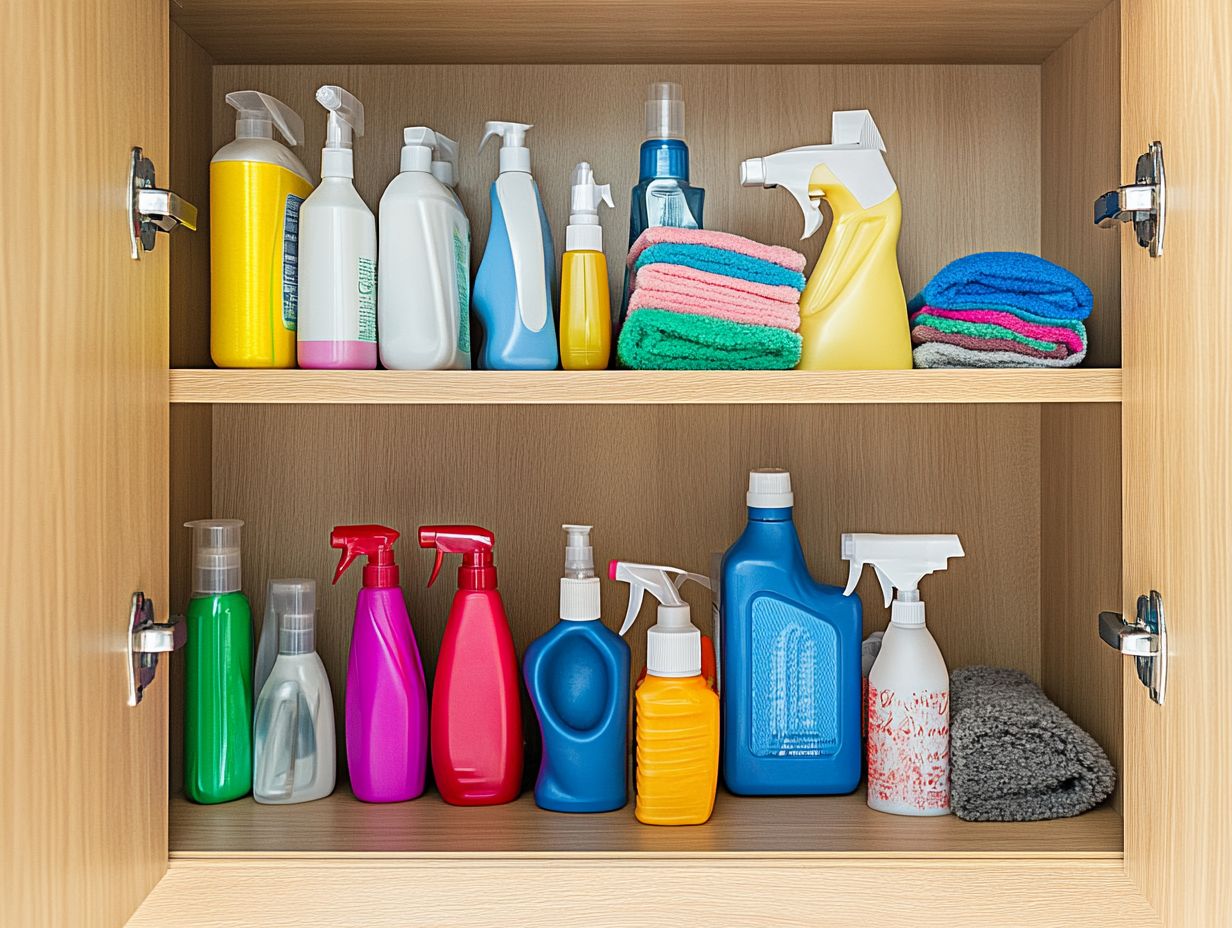
All-purpose cleaners are your go-to solutions for a variety of surfaces, making proper storage key to maintaining their longevity and effectiveness. Keep these cleaners in their original containers, securely closed to prevent leaks, and store them in a cool, dry place away from direct sunlight.
Organizing your cleaning supply area can significantly elevate your cleaning routine. Group all-purpose cleaners with related tools like microfiber cloths and sponges to have everything right at your fingertips, saving you time that would otherwise be spent searching.
For maximum effectiveness during your cleaning tasks, read the labels for specific instructions on dilution and application. Using the right amount prevents wastage and enhances the cleaner’s performance. Regularly check product expiration dates to ensure that your cleaners remain effective and safe for use.
6. Toilet Bowl Cleaners
Toilet bowl cleaners are specifically designed to tackle stubborn stains and bacteria, but safe storage is essential to prevent accidental exposures or misuse. Always keep these products in their original packaging, tightly sealed, and out of reach of children and pets. Mixing toilet bowl cleaners with other cleaning supplies is a recipe for disaster, so it’s best to avoid that altogether. By prioritizing safe storage practices, you can maintain a clean and hygienic bathroom environment.
Consider designating a specific cabinet or shelf for all your cleaning supplies to keep everything organized and easily accessible. This could include under sink storage solutions. If you have curious children or pets, using child-proof locks can be a game changer, providing that extra layer of safety. Always take the time to read and follow the manufacturer s instructions for optimal usage, ensuring both effectiveness and safety. Cleaning supplies safety should never be overlooked.
Regular inventory checks are also a smart move; they allow you to discard expired products, keeping your cleaning arsenal safe and reliable whenever you need it. This is a part of cleaning supplies organization.
7. Oven Cleaners
Oven cleaners are formidable agents, expertly formulated to tackle tough grease and baked-on residue, but they demand careful handling and storage due to their chemical properties. Always store these cleaners in their original containers, ideally in a well-ventilated area away from heat sources and direct sunlight. The safety of your household is paramount, so ensure that oven cleaners are securely kept out of reach of children and pets. Adhering to these guidelines will not only maintain the product’s effectiveness but also safeguard your home.
When you use these cleaners, it’s wise to don protective gloves and, if at all possible, goggles to protect your skin and eyes from any potential splashes, as recommended by cleaning methods experts. Ventilation is key during application; make sure to open windows or turn on exhaust fans to disperse any fumes that may arise. Always apply the cleaner to a cool oven surface and allow it to sit for the recommended time to achieve maximum effectiveness, following cleaning product labels.
Never mix oven cleaners with other household chemicals, as this can trigger dangerous reactions. By being mindful of these practices, you can ensure a safer and more efficient cleaning experience, as endorsed by experts like Martha Stewart.
8. Wood Cleaners
Wood cleaners are expertly designed to cleanse and safeguard your wooden surfaces, but proper storage is essential for maintaining their effectiveness and safety. Store these cleaners in their original containers, ideally in a cool, dry location, and keep them out of direct sunlight for the best results, following organizing tips.
Organizing your wood cleaners in a designated cleaning caddy not only improves accessibility but also enhances safety by keeping these products out of reach of children and pets, leveraging cleaning storage ideas. By ensuring the appropriate storage of wood cleaners, you help preserve both the integrity of the product and the beauty of your wood surfaces.
Given their chemical compositions, which often feature solvents and other agents that can impact the quality of wood finishes, it is vital to pay attention to expiration dates and disposal of cleaning containers. Regularly check your storage area for any leaks or damages to prevent hazardous spills.
In terms of using wood cleaners, applying them with a clean microfiber cloth allows for an even application and minimizes residue. Following a systematic approach designating a specific spot for each cleaner can streamline your cleaning process, ensuring that all necessary supplies are easily accessible while keeping your space organized.
What to Do in Case of Accidental Ingestion or Exposure
In the unfortunate event that you accidentally ingest or are exposed to cleaning products, taking immediate action is crucial to safeguard your health and minimize any potential harm. It s also important to store products properly and never remove labels to avoid accidental exposures.
Know your resources! Familiarize yourself with the contact information for resources such as the Poison Help Line and the National Capital Poison Center; these experts can offer helpful advice on how to respond effectively. For child safety, consider implementing child-proof locks.
Quick access to this information, coupled with a clear understanding of the symptoms associated with exposure to household chemicals, can significantly mitigate risks and enhance the safety of everyone in your home.
How to Dispose of Household Cleaners Safely
Disposing of household cleaners safely involves understanding the specific requirements for each type of product. Martha Stewart and Marcus Reeves from Sort and Sweet Inc offer expert advice on proper disposal methods. House Digest and other resources also emphasize the importance of following local regulations to ensure environmental protection.
Proper disposal of household cleaners is crucial for maintaining chemical safety keeping harmful substances away from people and pets and safeguarding the environment. Many cleaning products contain harmful chemicals that require specific disposal methods to prevent contamination and minimize exposure risks.
Follow local regulations for disposal; simply tossing them in the trash or pouring them down the drain isn’t an option. By embracing safety precautions and organized disposal methods, you can effectively manage your cleaning products, contributing to a safer, healthier environment for all.
Watch this video for tips on safe cleaning product disposal:
Frequently Asked Questions
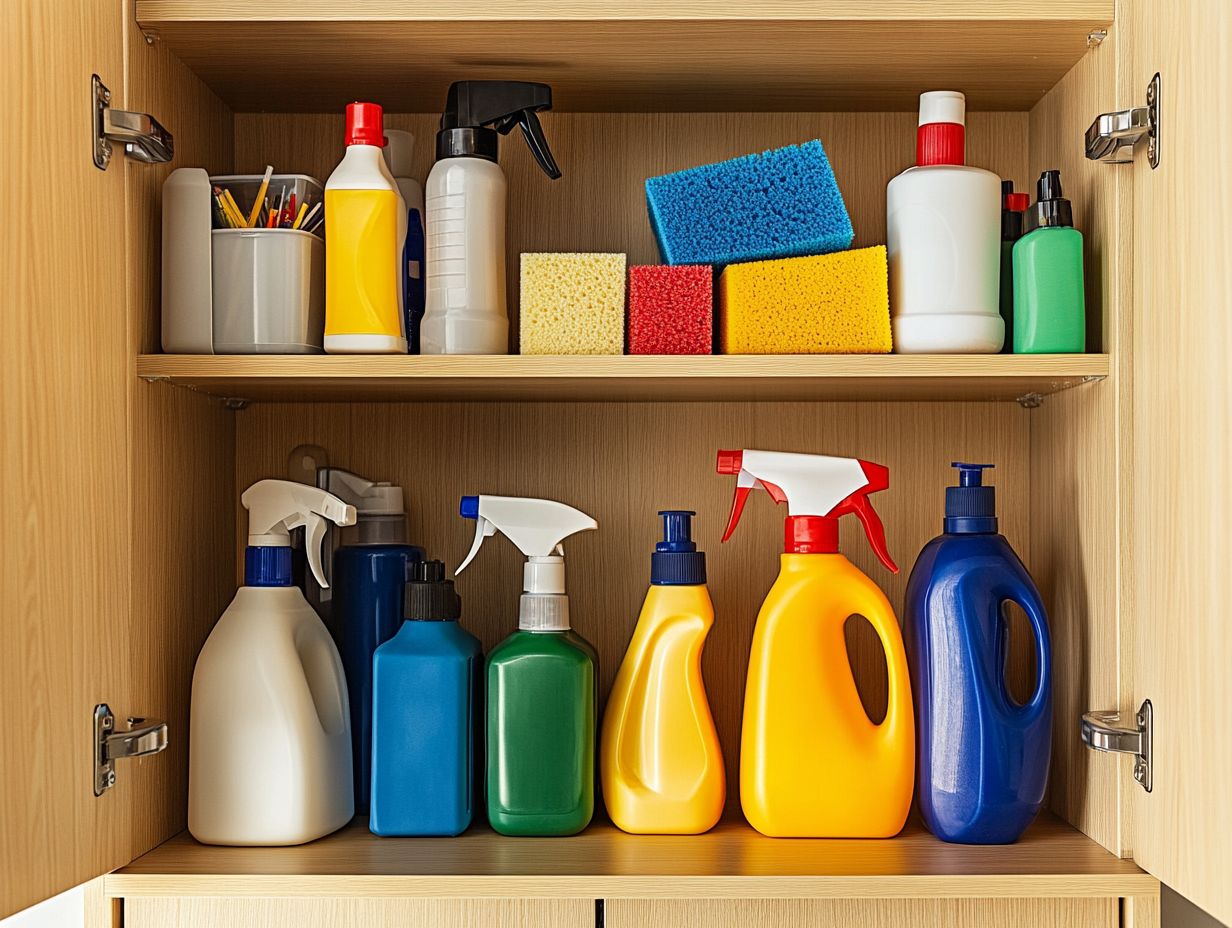
Experts from Savannah and Long Island emphasize the importance of proper storage and disposal of cleaning products. By following these cleaning tips and techniques, you can maintain a safe and organized home.
Here are some common questions and answers to help you with cleaning products organization, safety precautions, and proper storage techniques. Experts from Rutgers University and New York University recommend routine safety checks and organizing home strategies to ensure a safe environment.
What are the most common household cleaners and household cleaning supplies that need to be stored properly?
The most common household cleaners include all-purpose cleaners, glass cleaners, disinfectants, bathroom cleaners, kitchen cleaners, spray cleaners, and floor cleaners. Ensuring proper storage of these items, along with cleaning tools and equipment, is essential for maintaining a safe home environment.
Why is it important to properly store household cleaners and cleaning products?
Proper storage of household cleaners ensures the safety of everyone in the household, prevents accidental poisoning or harm, and prolongs the effectiveness of the cleaners. It is also crucial for child safety and pet safety.
Where should I store household cleaners and household cleaning supplies?
Household cleaners should be stored in a cool, dry, and well-ventilated area that is out of reach of children and pets. A locked cabinet or high shelf is ideal for storage. Consider using child-proof locks for added security.
How can I prevent accidental spills and leaks from household cleaners and cleaning products?
To prevent accidental spills and leaks from household cleaners, make sure the lids are tightly closed and the containers are properly sealed. Avoid storing cleaners near heat sources or in direct sunlight. Additionally, store products in their original containers, and never remove labels to ensure safety and proper usage.
Start organizing your cleaning supplies today to keep your home safe!
Can different types of household cleaners and cleaning products be stored together?
No, different types of household cleaners should not be stored together. This can cause dangerous chemical reactions, which are unpredictable and could be harmful.
Keep cleaners separated and stored according to their specific instructions. Use clear bins for organization and follow product directions for safe storage.
What should I do if a household cleaner or cleaning product spills or leaks?
Act quickly when a household cleaner spills or leaks! Clean up the area right away and dispose of any contaminated materials correctly.
Wear protective gloves and clothing, and make sure to ventilate the room by opening windows or using a fan. If it’s an emergency, don t hesitate to contact the Poison Help Line or the National Capital Poison Center for immediate assistance.

